

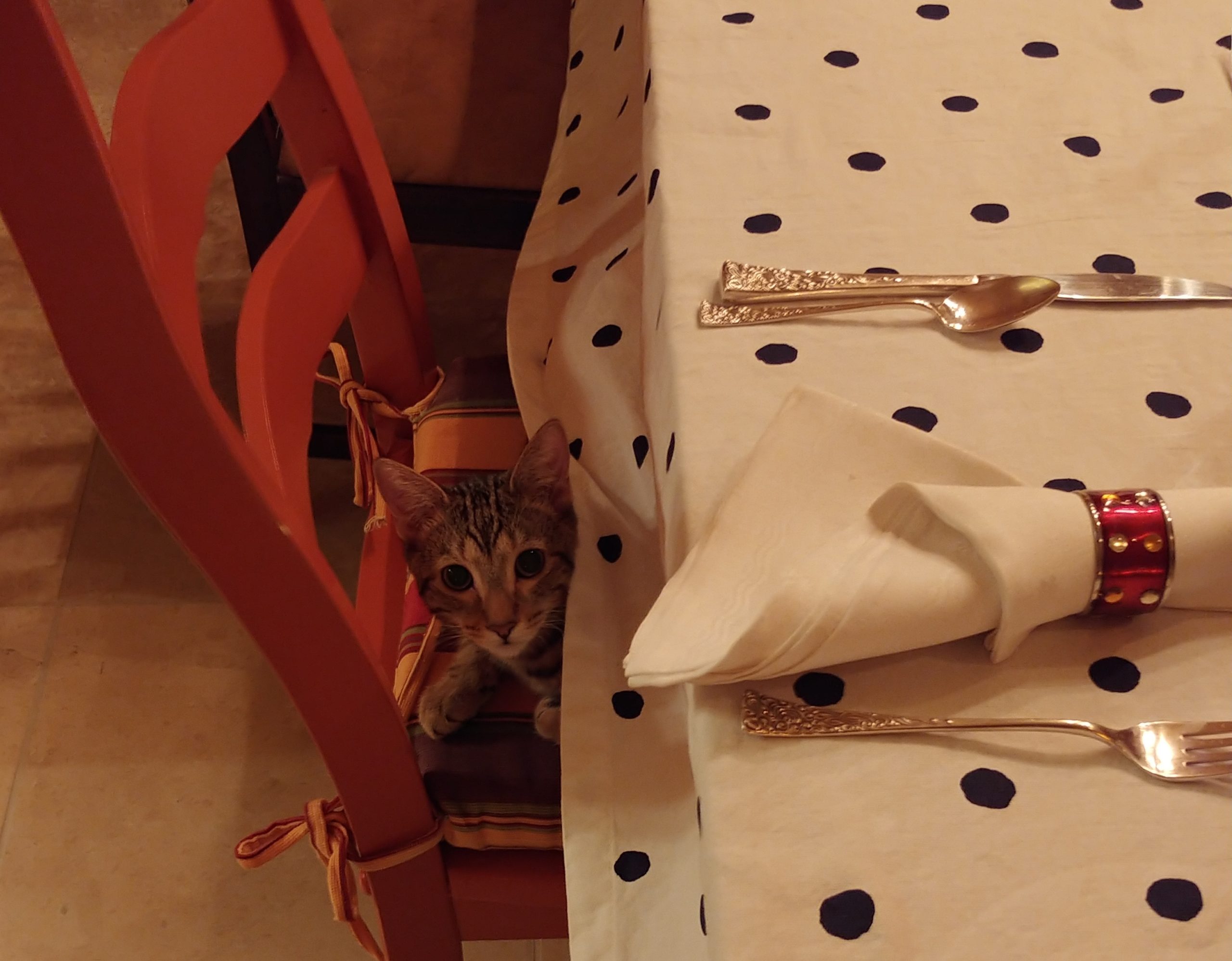
RITA ® Award-Winning Author of Fantasy Romance



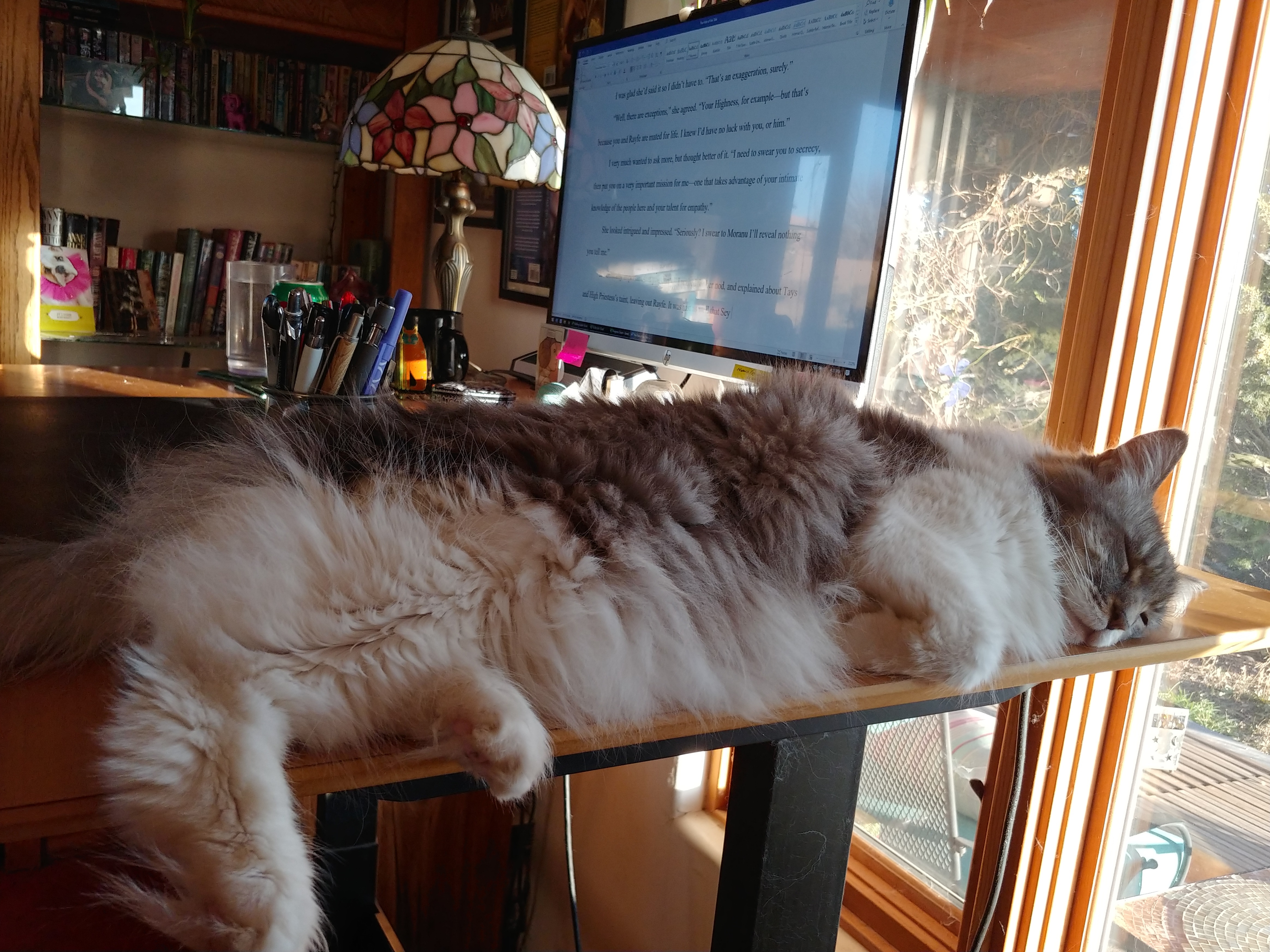



I put this photo on my podcast yesterday, but social media declined to show it, so I’m reposting! I spent time on Sunday lying in the sun and reading. The depthless blue skies were perfect for contrails, which seemed to appear from between my toes. Really lovely.
There’s been lots of talk on social media about the final season of Game of Thrones. Episode 4 aired on Sunday night (5/12/19) and there’s two episodes to go. While the battle scenes have been as epic and sweeping as promised, many people feel the show has gone off the rails. This is not the ending many of us hoped for.
Of course, all along, we were braced to lose beloved characters. The story created by George RR Martin has taught us well. Characters we love will die, sometimes suddenly, often brutally, and frequently without warning. He’s a master storyteller and he’s deliberately subverted the heroic fantasy tropes, enticing us to love and believe in a character, and then killing them suddenly. It’s so deftly done that, in retrospect, you can absolutely trace how the character’s personal flaws – hubris, naivete, etc. – lead to their untimely demise.
So, I don’t know about you, but I was braced. I had a checklist in my head of who’d be likely to do something stupid and die. I didn’t WANT to lose those characters but I accepted that it had to happen. Especially as the title of the show (which departs from the books) promises a life-and-death tournament leaving a single person on the Iron Throne. Also, as the story progressed, it became clear that the threat of the Night King and the devastating hordes from the frozen north posed a much greater problem than who got to be in charge. Former enemies became unlikely allies – in a tremendously satisfying way – to band together to face this world-killing threat.
I won’t go into details of how that aspect of the plot has failed our expectations of the dramatic progression of events. Instead I’d like to address why some of what’s going on feels so disappointing. It’s something I see happen a lot in TV and movies, especially long-running ones.
See, visual entertainment is necessarily plot driven. There’s a lot of reasons for this: visual narratives don’t allow for internal exploration of characters (which is why they sometimes resort to clumsy voice-overs); they appeal to a much wider audience that expects a faster pace of events with no “navel gazing;” and plot-driven stories are easier for a team of writers to produce. (They’re easily outlined in advance and produce clear dramatic beats.) I’d argue that this is why Romance seldom works in a visual narrative since love stories are character-driven.
Now, George RR Martin is a character-driven writer. Yes, the plot of the series (which is called A Song of Ice and Fire, which speaks much more to the Night King arc than the Iron Throne arc, just saying) has a complex set of plots and subplots, but they all arise from the character motivations. What the characters want drives the narrative. What happens in visual entertainment, when plot takes over as the primary driver of the story, is the character motivations can become subverted to serve the plot.
In other words, people suddenly stop acting like themselves and do things we don’t believe in order to advance the plot.
Sound familiar?
So, yeah, if your favorite Game of Thrones characters seem to be acting, well, out of character, it’s because they are. They’ve stopped being the complex, nuanced individuals (likable or not) that drew us into the story, and have become finger-puppet versions of themselves acting against a spectacular backdrop of dramatic plot.
Another example of this that will forever stand out in my mind is a late-season (this is a THING) episode of Buffy the Vampire Slayer, where Spike attempts to rape Buffy. It’s a clumsy scene, shocking – and was written specifically to address a rape-prevention week theme. Now, I’m all for preventing rape, education, and using story to reinforce that message. But for those of us invested in those characters, it was a total WTF moment. Spike nursed a soul-deep, unrequited love for Buffy (and we know she loved him, too), and he would NEVER have hurt her. It made zero sense. The plot made him into a paper cutout to demonstrate an issue.
As a character-driven writer, this drives me crazy. As a viewer once-invested in beloved characters that have been eviscerated into paper cutouts, I mourn. Really, I’d rather have wept over their deaths than see this happen to them. I’m not even sure I want to watch the last two episodes, frankly.
Anyway, it’s too late for the show. What’s done is done. But the takeaway for writers of all kinds is: RESPECT YOUR CHARACTERS AS PEOPLE. They are not puppets in your personal play, no matter how much you might feel like you are the god of your world. As creators and storytellers, we owe allegiance to the gift of these people entering our stories. We do them honor by listening to them.
To do otherwise fails us all.
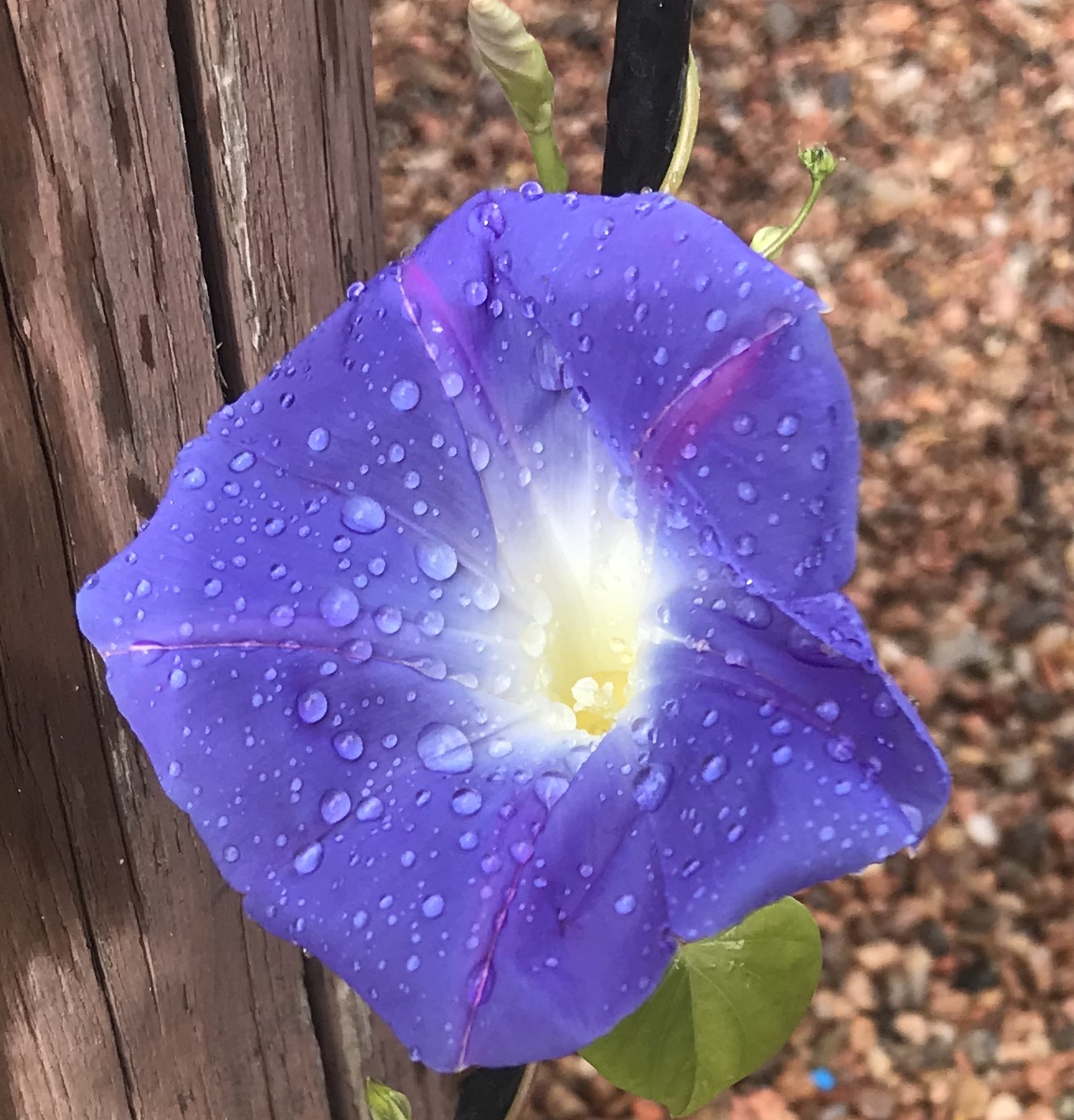

This slightly sodden morning glory was the last before the freeze, so I had to take a pic. Until next season, tender flowers!
So, last week I was at the nail salon. I go every-other week and see Ruby, who is a Mani/Pedi Goddess. I’ve been seeing her for two years now, so we know each other fairly well. She was asking me about Halloween and my plans – and I said I had Costume Pressure this year. I’ve been invited to a Big Shindig, hosted by George R.R. Martin’s assistant. Lots of Science Fiction and Fantasy types will be there.
Ruby asked if I didn’t have costume ideas, and I said sure, I could put something together, but I don’t really do Cosplay the way a lot of these people will be. A client of one of the other gals, overhearing, turns to me and says:
“Just go as one of George R.R. Martin’s characters. From what I’ve seen, all you’d have to do is roll around in the dirt!” And she cackles at her wit.
“I doubt George would find the humor in that,” I say, imagining the scene where I, a greatly junior author, turn up in dirt-covered rags and cheerfully announced to George that I’m Arya Stark. No no no.
Other Lady: Oh no – I’ve met George R.R. Martin and he has a *great* sense of humor!
Me: Yes, he does, but not so much about Game of Thrones.
Other Lady: That’s not true! When I met him at a party, my daughter wanted me to ask him to stop killing off his characters. So, since it was important to her, I did. I marched right up to him and I said “my daughter wants me to ask you to stop killing off his characters.” And he laughed!
Me: ~cringes in chair~
Other Lady: And do you know what he said? He said, “Tell her not to worry because I’ve got plenty more where those came from.” Isn’t that just too funny??
Me: ~nods politely~
Other Lady: So see – he *does* have a sense of humor about Game of Thrones. So you should just go covered in dirt, say you’re one of his characters, and he’ll think it’s funny.
Me: I’ll keep that in mind.
***
It occurred to me to share this story, because I get asked a lot about Dos and Don’ts when meeting favorite authors. Is it okay to ask them to sign a book? Will they get mad if I ask when the sequel is coming? That sort of thing.
My usual advice is that most authors LOVE to meet readers and are happy to sign books and talk about them. I really love to hear which characters or stories are favorites and why. And sure, authors hear a lot of the same questions, but that’s generally okay. We also have standard answers for them. Good on George for being able to laugh as he delivered his standard answer to something he hears All The Freaking Time.
It totally amazed me that this lady could be so tone deaf that she had no sense of that – or how her dismissal of his characters as all covered in dirt wouldn’t be insulting.
So, how do you talk to authors at parties – or anywhere, really? Like you talk to any human being. With kindness and consideration.
*with apologies to Neil Gaiman’s “How to Talk to Girls at Parties”
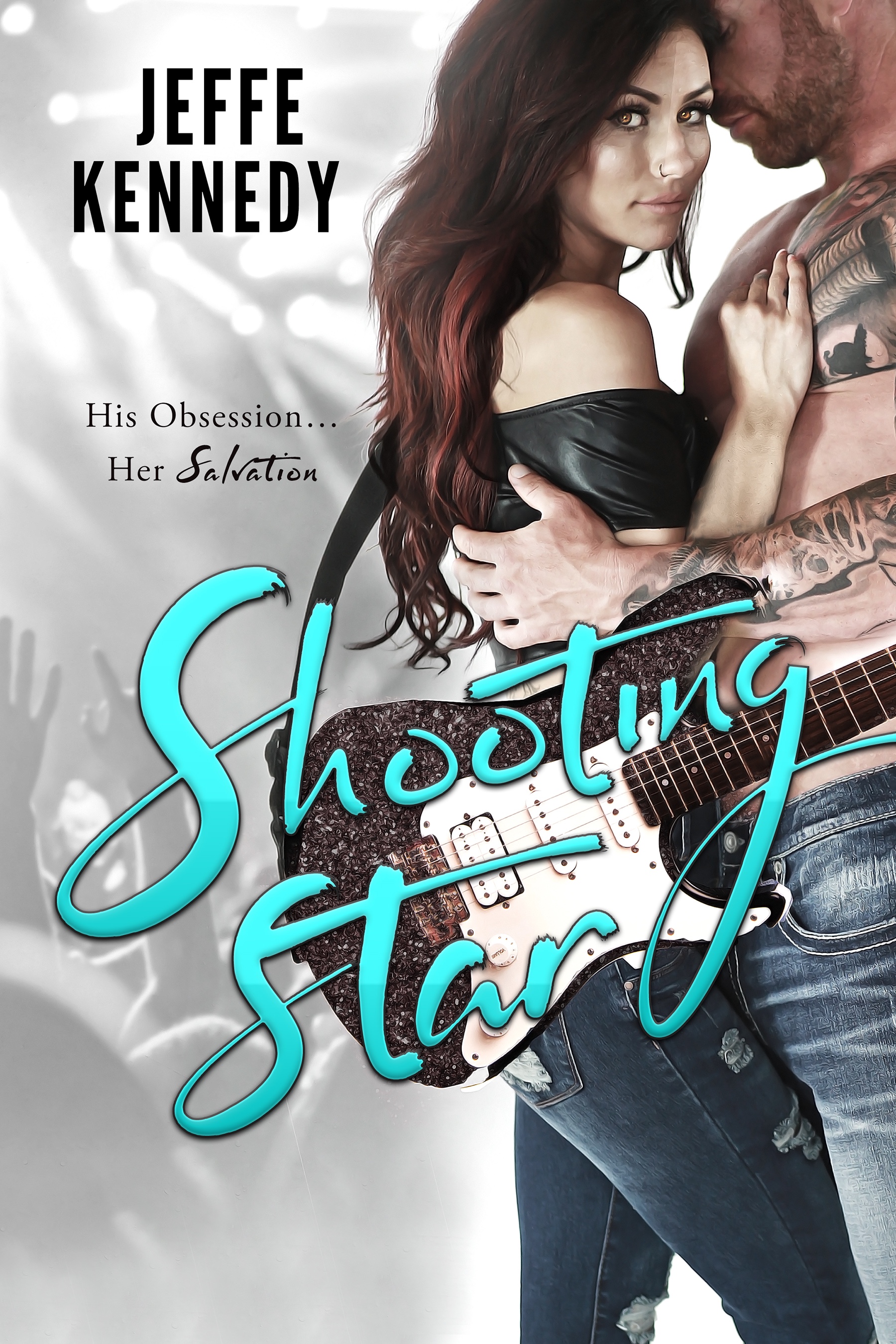

Not all desires are shiny and sweet—and the dark ones might change you forever…
It’s not the kind of obsession a tough Army guy can admit to—a jones for Ava, the pretty-princess pop star. Not just her body, the perfect product that sells all those magazines. Her music.
The critics call her human lip gloss, all style and no substance. To Joe Ivanchan, Ava is the exact blend of reality and fantasy that he can tolerate, the closest he’s willing to get to giving his heart after the injury and breakdown that got him out of the service.
But Ava is real. She’s a flesh and blood woman with a publicity machine and an album deadline, along with a whole team of handlers paid to shellac a pristine sheen over a damaged, desperate soul. A woman with fears, with secrets, with desires.
When Joe finds himself in an interview to join her security team as her driver, his instinct is to get away. But the woman behind Ava’s carefully focus-grouped image is even harder to walk away from. The angry needs tormenting her speak to something within Joe. Something empathetic, protective—and primal…
Besides, even a falling star can light up the darkest night.
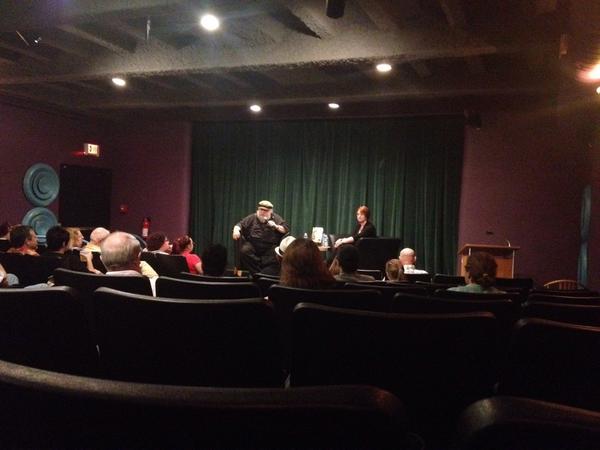
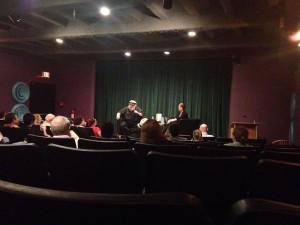 A week ago I got to go to George RR Martin’s theater here in Santa Fe, the Jean Cocteau Cinema. He’s doing really interesting things with it, having bought the old theater near the rail yard, rehabbing it and now, along with art house movies and screenings of Game of Thrones episodes, bringing in authors for signings and discussions. This was my first time to go, when Kim Harrison visited and George did a Q&A session.
A week ago I got to go to George RR Martin’s theater here in Santa Fe, the Jean Cocteau Cinema. He’s doing really interesting things with it, having bought the old theater near the rail yard, rehabbing it and now, along with art house movies and screenings of Game of Thrones episodes, bringing in authors for signings and discussions. This was my first time to go, when Kim Harrison visited and George did a Q&A session.
VERY fun.
And so interesting. I had the best time.
As you can see from the picture, the venue is an intimate one and listening to these two superstar writers discuss the business totally rocked my world. George is a terrific interviewer and I got insights into his career as well. All in all, a terrific evening and I greatly appreciate what he’s doing for both our community and for writers everywhere.
That said…
Yeah, you knew there was a “but” coming, right?
A funny thing happened that’s been bugging me ever since.
After about an hour of Q&A, Kim went out to the lobby to sign books. Because it’s a very small, cramped space (like most of the older parts of Santa Fe), George asked us all to stay seated so she could settle and then he excused us by rows to go out there gradually. My friend and I were a number of rows back, so we sat a fair amount longer and essentially chatted with George. Which was so fun. People asked him questions and he asked us who else we’d like to see visit. That was like getting to ask Santa Claus for a pony – and believing he’d deliver.
One gal mentioned Stephen R. Donaldson and asked if he’s still writing and living in Albuquerque. George frowned and said he had no idea. Now, if you follow me on Twitter and Facebook, you probably know I recently met Steve at Bubonicon and, in my capacity as VP of Programs, subsequently invited him to speak to my local RWA chapter, LERA. My friend, also a LERA member, elbowed me, so I spoke up and said yes! Steve is writing a new book in a new series, that he’d visited our chapter in Albuquerque and read to us from it and it’s wonderful. (It really is.) It was a great program and everyone really enjoyed hearing about his process and career. I probably forgot to say anything about it here.
Listening to the amazing Stephen R. Donaldson talk about his life as a writer at the #RWA #LERA meeting pic.twitter.com/uOHQwsPPP4
— Jeffe Kennedy (@jeffekennedy) September 13, 2014
George looked confused and asked where this was again? I said, you know, Romance Writers of America? Kim had referenced it earlier, though saying she was no longer a member as she doesn’t write romance. And he said, yes, he knew about RWA, that he was just having a hard time picturing Steve Donaldson talking to a bunch of romance writers.
Yeah.
I mean, here I’m having a conversation with one fantasy-writer legend about another, in front of an audience, so I was a little flustered. I explained that I met Steve at Bubonicon, which had also been referenced, and how I’m VP of Programs for LERA and how I write crossover between fantasy and romance and so do many of our members and blah blah blah. It was only later that it hit me what he’d really said. That it occurred to me to wonder exactly what he had been picturing. What does “a bunch of romance writers” look like? Somehow I get this image of a group of women dressed in chintz, sipping tea and giggling. With the, supremely frustrating leisure of hindsight, I wish I’d said something like “Why? We write books, too.”
Don’t we?
I know what we’re talking about here and I don’t really mean to slam George Martin for this, because I think he simply and genuinely revealed a very common misperception. We all know that Romance is the least respected genre out there. Written largely by women, for women, there’s an idea that romance writers are somehow…not really writers. After all, it’s just formula, right? We plug in different hair and eye colors, maybe a new setting and a different order of sexual positions and BOOM – on to the next book! We don’t actually delve into the craft or anything.
So, over the last week, the more I thought about it (read: brooded a teensy bit), the more it annoyed me. Why on earth WOULDN’T we have a major league writer come talk to us, regardless of genre?? Writing is writing. A writer’s career follows the same general landscape regardless of the actual stories we write.
*deep cleansing breath*
Maybe that’s not what he meant. Maybe he wondered what on earth we’d get out of hearing Steve talk. The answer is that we got tons out of it. For days after, we traded notes on what we most got out of Steve’s talk. Steve himself emailed me after and said how much he enjoyed our group and how he’d love to come back anytime. In fairness, he may have been pleasantly surprised to find such a savvy, smart, creative and amazing bunch of writers who really appreciated what he had to say.
I think, in the end, this is just part of the ongoing effort to bring romance out from under the bed, hidden by lacy dust-ruffles and tucked in next to the sex toys. Maybe by having these conversations, by inviting writers from other genres to speak to us, we’re doing the work of demonstrating that we are writers, like any others. We’re invested in our craft and our careers. We work hard to learn, grow and improve.
Maybe I’ll invite George to come speak to us next.